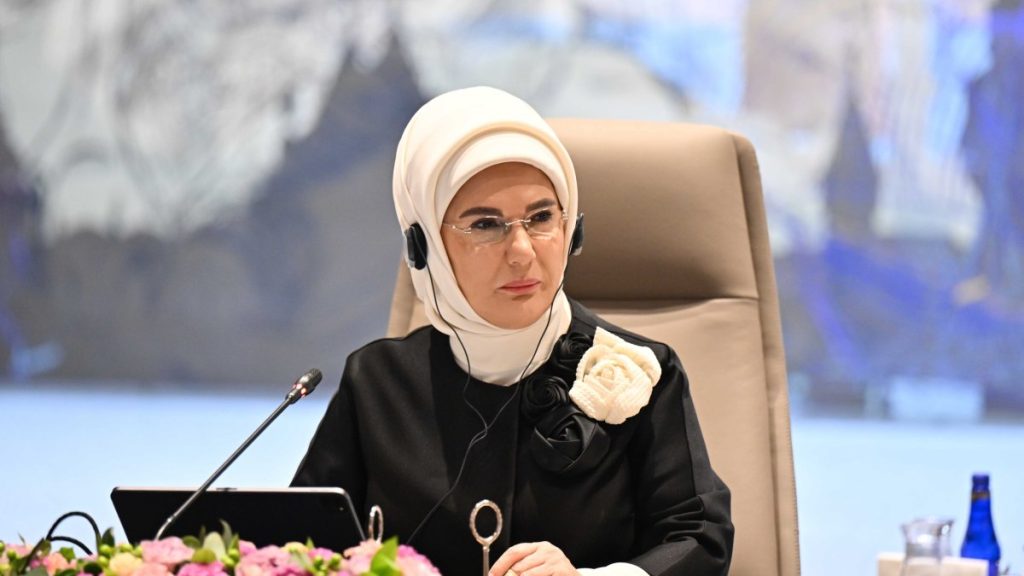The Zero Waste Project, initiated under the patronage of first lady Emine Erdoğan in 2017, has completed its seventh year. Over these seven years, the movement has contributed to both Türkiye’s economy and its environment.
The Zero Waste Advisory Board, led by Erdoğan and established on April 12, 2023, includes notable figures such as Guy Bernard Ryder, U.N. assistant secretary-general for policy, and 13 members from countries including the U.S., Sierra Leone, Chile, Bangladesh, Brazil, Colombia, the Netherlands, Morocco, Belgium and India. After the meeting with the advisory board members, they toured the Painting Museum at Dolmabahçe Palace and answered questions from the press.
Since its launch, the zero waste movement has received numerous awards from organizations such as the United Nations Food and Agriculture Organization (FAO), the United Nations Development Programme (UNDP), U.N.-Habitat, the Mediterranean Parliamentary Assembly and the World Bank. The seven-year performance of the movement has been impressive. The slogan for its seventh year was “7 Years, 7 Continents,” and the project has achieved many successes.
Ali Rıza Öner, president of the Waste Management and Waste-to-Energy Producers Association (TAYED), highlighted that the zero waste movement has raised awareness about zero waste across all sectors of the country. He explained that the “Reduce, Reuse, Recycle” motto has gained widespread popularity.
“Proper waste management is a prerequisite for fighting climate change. With the zero waste movement, initiated under the patronage of first lady Emine Erdoğan in 2017, the recovery rate, which was 13% seven years ago, has increased to 35% this year. The goal is to reach a recovery rate of 60% by 2035,” he said.
Öner further emphasized that the movement’s seven-year track record is full of successes, including the recovery of 60 million tons of waste, contributing TL 185 billion ($5.29 billion) to the economy, saving 498 million trees from being cut down and preventing the release of 5.9 million tons of greenhouse gases.
So far, 29.3 million tons of paper and cardboard, 7.8 million tons of plastic, 2.9 million tons of glass, 3.7 million tons of metal, 16.2 million tons of organic and other recyclable wastes, totaling 59.9 million tons of recoverable waste, have been reintegrated into the economy. Additionally, 22 million people have received zero waste training as part of the movement.
For the Zero Waste Project to continue successfully, existing solid waste disposal facilities must operate sustainably, Öner stated. “These facilities generate revenue from the electricity they produce. Some facilities whose 10-year Renewable Energy Resources Support Mechanism (YEKDEM) period has ended will need to continue their operations under the free electricity price after the mechanism expires. It will not be sustainable to continue this effort under the current free electricity pricing,” he said. Öner suggested that the best solution would be to establish a new fixed price for projects that have completed their YEKDEM period based on their contracts.
Öner also pointed out that Türkiye could serve as a model for lower and middle-income countries in solid waste disposal. “Most of the world collects waste in a mixed manner. The waste disposal models applied in our country are highly suitable for other countries. We regularly host foreign visitors at our facilities. Just 15 days ago, Lesotho’s Prime Minister Sam Matekane, invited by President (Recep Tayyip) Erdoğan, visited our facilities and gathered information. They invited us to invest in their country, and we plan to reciprocate the visit in the coming months,” he concluded.
Professor Saleem Ali, a member of the advisory board and a geography professor at the University of Delaware in the U.S., highlighted the importance of the initiative, saying: “I believe this is a crucial step in implementing what we call the ‘Circular Economy.’ In this system, we use waste products to create useful items. Our biggest goal is to have as little waste as possible. This makes sense both economically and environmentally. It’s a win-win strategy.”
“Since the advisory board was formed, we’ve conducted several case studies, presented our findings to the public, and conducted in-depth research on the best zero-waste management strategies. We also discussed the remaining tasks for the advisory board in the upcoming 18 weeks, focusing on developing our communication strategies and working with young people to make the Zero Waste Project more recognized among the younger generation,” he said.
Hakima el Haite, a member of the advisory board, discussed how zero waste could be integrated into policies and strategies. She stated: “Imagine a world where we do not waste food, where 40% of our food production does not go to waste, and where hunger is no longer a problem. Imagine a world where waste is recycled and reused in production processes. We will reduce the natural resources used to produce waste. Imagine going from waste to fertilizer or from waste to energy – this is zero waste. This is exactly what we are advocating for, led by Emine Erdoğan.”
“She is a great champion, and you are fortunate to have her in Türkiye. We are working to raise awareness that the zero waste initiative is not just a debt but a credit concept. Today, with this initiative, we hope to change the way we use waste recovery and treatment methods. We will implement zero waste principles in all our policies and projects,” she added.


